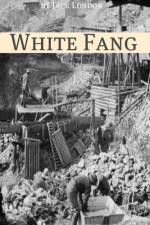|
|
White Fang Author/Context
Jack London was born John Griffith Chaney in San Francisco, California on January 12, 1876. Although he was raised as the son of Flora London, a spiritualist, and John London, a Civil War veteran, he was actually the illegitimate son of Flora and William Chaney, an astrologer and journalist who deserted her soon after Jack's birth. Jack did not learn about the true events surrounding his birth until he was in his twenties.
Raised in Oakland, California, Jack did not stay in school long as a child. In his twenties he returned to high school in order to complete his education. During his life, Jack London had a large number of professions, which greatly enhanced his writing. He was a sailor, a factory worker, an oyster pirate, a member of the California Fish Patrol, a railroad hobo, and a gold prospector in Alaska. He was also a wartime journalist, and covered both the Russo-Japanese War and the Mexican Revolution. It was during his travels in these various professions that he was exposed to socialism, of which he became a staunch supporter. He was an impassioned street corner speaker, and ran once unsuccessfully for mayor of Oakland on the socialist ticket.
London was married twice, first in 1900 to his math tutor, Bess Maddern. They had two daughters together, Joan and Bess, but the marriage quickly strained and the pair divorced in 1903. He then married his secretary, Charmian Kittredge, soon after the separation. He considered her the love of his life, and they traveled and wrote together. London died on November 22, 1916, at the age of 40, as a result of health problems that culminated in kidney failure.
Jack London was a powerful influence on American literature of the twentieth century. One of the most important of his ideas was "survival of the fittest," a version of the theories of Charles Darwin that emphasized competition in nature for the betterment of the species. Many American authors adopted his brutal approach. The idea not only appeared in literature as London first envisioned it, but evolved into such diverse concepts as social Darwinism and some aspects of psychology. As a result, London's work has had a wide-ranging impact.
London also pioneered the use of environment in literature to explain character, trying to show how character was formed in a nearly pre-Freudian era. The combination of this and his brutally honest telling of living in nature became a trademark of his writing. His realistic portrayal of life influenced writers from Stephen Crane to F. Scott Fitzgerald. His writings allowed other authors to be less afraid of portraying the brutality and cruelty of life, as well as freeing up such diverse settings and characters as the Yukon and wild animals. His approach to writing was unique, especially for the time period during which he worked.
Bibliography
"London, Jack." Encyclopaedia Brittanica. 1999.
Lundquist, James. Jack London, adventures, ideas, and fiction. Ungar: New York, 1987.




